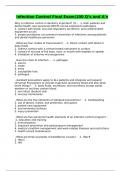Infection Control Final Exam|100 Q’s and A’s
Why is infection control in dentistry important? (3) - -1. both patients and
dental health care personnel (DHCP) can be exposed to pathogens
2. contact with blood, oral and respiratory secretions, and contaminated
equipment occurs
3. proper procedures can prevent transmision of infections among patients
and dental healthcare personnel
-What are four modes of transmission? - -1. Direct contact with blood or
body fluids
2. indirect contact with a contaminated instrument or surface
3. contact of mucosa of the eyes, nose, or mouth with droplets or spatter
4. inhalation of airborne microorganisms
-Give the chain of infection. - -1. pathogen
2. source
3. mode
4. entry
5. susceptible host
6. pathogen
-standard precautions apply to ALL patients and integrate and expand
Universal Precautions to include organisms spread by blood and alos what
three things? - -1. body fluids, secretions, and excretions except sweat,
whether or not they contain blood
2. non-intact (broken) skin
3. mucous membranes
-What are the five elements of standard precautions? - -1. handwashing
2. use of gloves, masks, eye protection, and gowns
3. patient care equipment
4. environmental surfaces
5. injury prevention
-What are five personnel health elements of an infection control program? -
-1. education and training
2. immunizations
3. exposure prevention and postexopsure management
4. medical condition management and work-related illnesses and restrictions
5. health record maintenance
-What are three examples of bloodborne viruses? - -1. Hep B
2. Hep C
3. HIV
, -What are three characteristics of Hep B, Hep C, and HIV? - -1.
Transmissible in healthcare settings
2. can produce chronic infection
3. are often carried by persons unaware of their infection
-what are the potential routes of transmission of bloodborne pathogens? - -
1. Patient-->DHCP
2. DHCP-->Patient
3. Patient-->Patient
-What are three factors influencing occupational risk of bloodborne virus
infection? - -1. Frequency of infection among patients
2. risk of transmission after a bood exposure (ie type of virus)
3. type and frequency of blood contact
-What three body fluids have a high concentration of HBV? Moderate?
Low/Not detectable? - -High:
1. Blood
2. Serum
3. Wound exudates
Moderate:
1. Semen
2. Vaginal Fluid
3. Saliva
Low/Not Detectable:
1. Urine
2. Feces
3. Sweat
4. Tears
5. Breast Milk
-What are 3 important things to remember about the Hepatitis B Vaccine? -
-1. Vaccinate all dental healthcare professionals who are at risk of exposure
to blood 2. provide access to qualified health care professionals for
administration and follow-up testing
3. test for anti-HBs 1 to 2 months after 3rd dose
-As far as HCV Infection in Dental Healthcare settings, risk of HCV
transmission appears very high/low. - -low
-What are four risk factors for HIV Transmission after percutaneous exposure
to HIV-Infected blood per a CDC case-control study? - -1. deep injury
2. visible blood on device
Why is infection control in dentistry important? (3) - -1. both patients and
dental health care personnel (DHCP) can be exposed to pathogens
2. contact with blood, oral and respiratory secretions, and contaminated
equipment occurs
3. proper procedures can prevent transmision of infections among patients
and dental healthcare personnel
-What are four modes of transmission? - -1. Direct contact with blood or
body fluids
2. indirect contact with a contaminated instrument or surface
3. contact of mucosa of the eyes, nose, or mouth with droplets or spatter
4. inhalation of airborne microorganisms
-Give the chain of infection. - -1. pathogen
2. source
3. mode
4. entry
5. susceptible host
6. pathogen
-standard precautions apply to ALL patients and integrate and expand
Universal Precautions to include organisms spread by blood and alos what
three things? - -1. body fluids, secretions, and excretions except sweat,
whether or not they contain blood
2. non-intact (broken) skin
3. mucous membranes
-What are the five elements of standard precautions? - -1. handwashing
2. use of gloves, masks, eye protection, and gowns
3. patient care equipment
4. environmental surfaces
5. injury prevention
-What are five personnel health elements of an infection control program? -
-1. education and training
2. immunizations
3. exposure prevention and postexopsure management
4. medical condition management and work-related illnesses and restrictions
5. health record maintenance
-What are three examples of bloodborne viruses? - -1. Hep B
2. Hep C
3. HIV
, -What are three characteristics of Hep B, Hep C, and HIV? - -1.
Transmissible in healthcare settings
2. can produce chronic infection
3. are often carried by persons unaware of their infection
-what are the potential routes of transmission of bloodborne pathogens? - -
1. Patient-->DHCP
2. DHCP-->Patient
3. Patient-->Patient
-What are three factors influencing occupational risk of bloodborne virus
infection? - -1. Frequency of infection among patients
2. risk of transmission after a bood exposure (ie type of virus)
3. type and frequency of blood contact
-What three body fluids have a high concentration of HBV? Moderate?
Low/Not detectable? - -High:
1. Blood
2. Serum
3. Wound exudates
Moderate:
1. Semen
2. Vaginal Fluid
3. Saliva
Low/Not Detectable:
1. Urine
2. Feces
3. Sweat
4. Tears
5. Breast Milk
-What are 3 important things to remember about the Hepatitis B Vaccine? -
-1. Vaccinate all dental healthcare professionals who are at risk of exposure
to blood 2. provide access to qualified health care professionals for
administration and follow-up testing
3. test for anti-HBs 1 to 2 months after 3rd dose
-As far as HCV Infection in Dental Healthcare settings, risk of HCV
transmission appears very high/low. - -low
-What are four risk factors for HIV Transmission after percutaneous exposure
to HIV-Infected blood per a CDC case-control study? - -1. deep injury
2. visible blood on device



